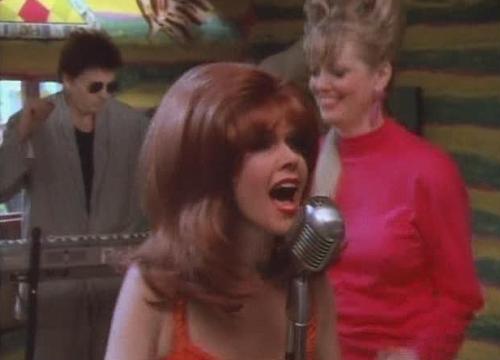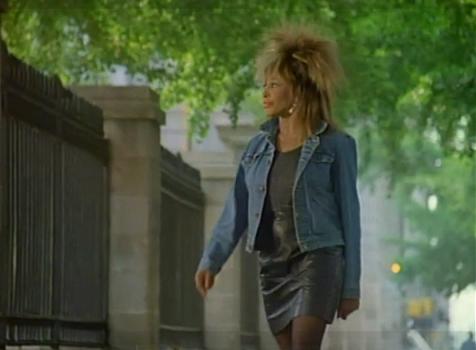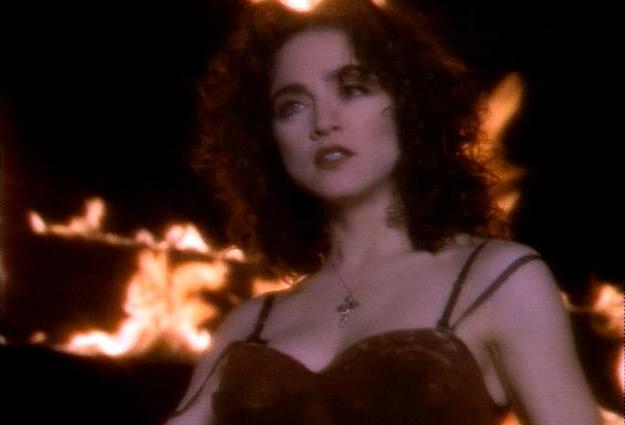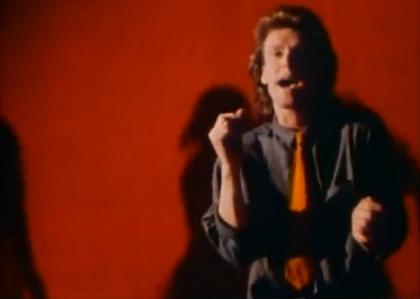Ultimate Pop Song Tournament #6
Also, this is my last full Tournament-related entry on the blog, since I already wrote the capsules for the 16 songs competing under the Groove Thang umbrella. You can read those blurbs here, here, here, and here, and trust that I voted for Beyoncé, Missy, Nelly, Jay-Z and Alicia (though I wish I could keep both entrants in Game 28 and squash 27), Michael, Salt 'n' Pepa, Prince, and Eminem.


Rock Warriors, Game 21 (Vote Here)
"Edge of Seventeen" (Stevie Nicks) vs. "Take Me Home Tonight" (Eddie Money with Ronnie Spector)
These songs are both so iconic that they have both been re-purposed as movie titles. I love them so much that I bought a ticket to Edge of Seventeen purely out of fondness for Stevie (though it turned out to be a good flick, too), and I almost bought a ticket to Take Me Home Tonight, which is really saying something, purely out of fondness for What Ronnie Say. I would not change a thing about either song, which is all the more wonderful because, objectively speaking, they could both use some work, trimming down Stevie's white-witch Gesamtkunstwerk and ordering a rewrite on Eddie's marble-mouthed verses. But I'm telling you, I'd be mad at anyone administered any of these changes. In the same way you don't change Barbra's face or close the gap in Madonna's teeth, you don't mess with "Edge" or Eddie, which work triumphantly, albeit in opposite ways. "Take Me Home Tonight" packs a thrill of pure distillation: it all boils down repeatedly, and brilliantly, to the gusto of the title phrase and the pop power of the orchestration underneath it. If that's not enough, you get hit even harder with Ronnie's invitation to be her little baby. The whole song soars on just those elements, which isn't to say the rest is worthless, but that it can stand to be worthless because the money-shots are so bonafide. I actually like the shaggy way Eddie sings, all thick-tongued and jowly and not caring how unsexy he is. He's not unlike Winnie-the-Pooh on a randy night in the Hundred Acre Wood, where all the honey's been switched out for Budweiser, drunk straight from the pot. Put otherwise, this is the rock song that Norm from Cheers would come up with, but Norm had needs, too, and he ought to have a song. Good for him that the one he got is this fantastic.
If Eddie aces the bite-sized nuggets that can canonize a whole tune, Stevie proves an astonishingly artful mistress of total dilation, letting "Edge of Seventeen" go on and on past the point of structure, although that hummingbird guitar riff underneath the whole thing provides quite a sturdy scaffold. This song has about eleven bridges, and every one of them has got rocking veins and thrumming arteries. The narrative seems both specific and a little bit dada. Certainly the imagery of abandoned hallways and changing/unchanging seas and white-winged doves means a little more to Stevie than it does to us, but she does more than put it over. She's singing like a woman in a rock trance, and she manages to slip us the same mickey that's obviously got her hallucinating some crazy stuff. "Edge of Seventeen" is a journey. Pack your blackberry-colored crêpe and your Stonehenge jewelry. Every time this bus hits a new pit stop, I vote for it again. Eddie won't care. He's already having the night of his life.


Rock Warriors, Game 22 (Vote Here)
"Livin' on a Prayer" (Bon Jovi) vs. "Crazy" (Gnarls Barkley)
No one has yet released a movie called Livin' on a Prayer, which is too bad, because I would absolutely attend it, especially if it were about Tommy, Gina, his six-string, her job at the diner, how they've got each other, and how that's a lot. Improbably enough, the movie to which it is stitched in my mind is the Paltrow/Ruffalo stinkeroo View from the Top, an epochally vapid air-hostess comedy where a few chords of "Livin' on a Prayer" ring out over one scene; for some reason, I recall an escalator. The implication is that the filmmakers perceived Bon Jovi to be part and parcel of the joyfully threadbare kitsch that is View from the Top's barrel-scraping métier. But I remember everyone in the theater, by which I mean all nine of us, immediately singing along with JBJ, and I remember thinking, "This song is art that only trash filmmakers would confuse with their own garbage."
I gather this is an unfashionable statement. I gather I am supposed to be embarrassed of how fantastic an album I think Slippery When Wet is, especially if you relieve it of any nonsense obligation to qualify as "hard rock." Megadeth is right down the aisle if that's what you're after. Also Gwar. But in the meantime, "Wanted Dead or Alive," "Never Say Goodbye," "You Give Love a Bad Name": that's a lot of jewels on one disc, if you ask me, and the fraternal affection circulating between Jon's singing and Richie's guitar-playing made for a welcome spectacle of 80s rock heroes openly relishing each other's camaraderie, instead of everyone lunging to out-thrust and out-pick and out-macho each other, often to unintentionally hilarious effect (Poison, Slaughter, Britny Fox, what have you). Trust me, I'm as surprised as you are that a song can possibly overcome the early stain that affixes to "Livin' on a Prayer" with that bizarre Waa-oo Waa-oo Waa-oo-oo-oo opening, as though Bon Jovi has ripped some Uruk-Hai out of the soil of Jersey City and speared them into singing along. But Tommy and Gina's affair is rivaled only by Jack and Diane's as the most gratifyingly narrated and the most tenderly evoked anywhere in amped-out 80s rock. Rooting for them and rooting for the song become indistinguishable, even before the final, key-vaulting, indescribably ecstatic chorus. Sorry, Gnarls Barkley. "Crazy" is a funky platypus of a disco-novelty-hip-hop track, featuring excellent, passive-aggressive use of the phrase "Bless your soul." But you haven't got a you-know-what of nabbing my vote.


Rock Warriors, Game 23 (Vote Here)
"Here I Go Again" (Whitesnake) vs. "Mr. Brightside" (The Killers)
David Coverdale sings with the aural equivalent of bedroom eyes, so it's a real thrill when that low, post-coital tenor of his gets so steadily roused to action and exuberant apostrophe over the course of "Here I Go Again." Among the many elating moments in The Fighter were the two or three seconds of Mark Wahlberg pulling up to the curb at Amy Adams' house, or maybe his ex-wife's, and switching off the engine after a few beats of this heroic ode to changing your own course. I suddenly feel sad that my 10-year-old self thought the "hair metal" era was so full of intimidating alpha males who would probably beat me up if they ever met me. Whatever posturing was required of them, and I'm sure many of them enjoyed the hell out of that, it's hard to imagine a less thuggish, more emotionally open lyric than "I'm just another heart in need of rescue / Waiting on love's sweet charity." Coverdale puts no distance between himself and the sentiment, and if you're not watching him glare at you from underneath that perpetually-tilted forehead, and you aren't confronted with the blatant objectification of Tawny Kitaen in the famous give-that-car-a-lapdance video, it is tempting to call the emotional candor of this song—the "I Will Survive"ness of it all—positively feminine. I've been hooked on it for 25 years, so as much as I love "Mr. Brightside," and as much of a sucker as I am for a good, dirty rhyme-scheme fakeout ("And my stomach is sick... And she's touching his chest, now"), it's only had a few years to catch up. Is it a more elaborate, more ambitious, more sophisticated and rangy song? Indubitably. Can I vote for it? No. Is this love, that I'm feeling, is this the love, that I've been searching for, for Whitesnake? Yes.


Rock Warriors, Game 24 (Vote Here)
"Don't Stop Believin'" (Journey) vs. "Love Shack" (The B-52s)
It has finally come to pass, after 24 standoffs: I simply refuse to choose. The first and second and third times I saw Monster in a theater, I knew that "Don't Stop Believin'" would be indelibly etched into my pop imagination. Even apart from its perfect, heartbreaking appropriation in the final moments of the story of Aileen Wuornos—in a movie that delivered about ten times over on my initial expectations—I realized that I had underestimated the song even more drastically than that. Journey had always seemed like a joke to me, primarily known as a band that was always taking up what I considered to be someone else's slot on the jukebox at Pizza Hut. (Boy Meets Girl's, Anita Baker's, Karyn White's... I showed up to the Hut with a stack of quarters and a frequently-disrupted itinerary.) Where Bon Jovi's or Whitesnake's surprising, bare-faced emotionalism seemed unexpected and endearing, Steve Perry's seemed grandiloquent, even cheesy. Was it age as much as a note-perfect reintroduction in narrative context that turned me around on "Don't Stop Believin'"? I now can't get enough of Perry's patently unfaked empathy with the girl in his song, or of the gorgeous, reverberating piano that sounds like a church-organ made of silver-plated glass, or of the early guitar riff that accelerates and accelerates like the lights you see from a fast-sailing train. Every member of the band, from writing to recording, has done the requisite work so that ending a chorus with "Ohhh-oh-OOOOHHHHH!!!!" doesn't seem like a lame cop-out but a calling forth of fully-churned feelings that you cannot express in any other way. I'm a weeper at this song, and I refuse to feel bad about it.
But that doesn't mean I can turn my back on my youth-shaping B-52's, whom I initially cottoned to through their eco-conscious, race-through-the-woods music video for "Channel Z." If you can believe it, some numbskull at the record company, or maybe someone too fun-loving to give much thought to these kinds of decisions, had saved up "Love Shack" as the second single released from the Cosmic Thing album, but what a single it is: rambunctious, bright as magic markers, giggly as love, shiny as gin. It's made up of such crazy parts, organized and protracted in such krazy-quilt patterns, that despite the lingering traces of verse-chorus-verse, it feels as much as anything like a Romper Room riff on "Edge of Seventeen." What do you think it was like when Cindy and Kate first realized how ideal they sounded in harmony, and that neither of them could think of an ad lib too crazy for the other? What was it like when they told Fred, "Of course we know you're gay, you fussy queen, let's day-unce!"? What was Keith Strickland thinking, keeping so quiet while he jammed so handsomely on that twangy guitar, and while everyone else regularly lost their minds, in a good way? The Love Shack seems like even more fun than the Shortbus Salon, and with any luck, the Small Town Girl and the Streetlight People will find their way to it one day. I'll be there to toast them with some umbrella'd cocktail, possibly fermented out back, cutting a rug with whomever wants to, refusing to choose among them.
Labels: Blog Buddies, Music, Ultimate Pop Song Tournament
 Nick's Flick Picks: The Blog
Nick's Flick Picks: The Blog

































 Mark Blankenship of
Mark Blankenship of  The four best things about the outcome are that we didn't forget about anything, took into account every single Top 40 hit in existence, have utterly irreproachable taste, and made absolutely no mistakes. Mark has asked us not to invoke any runners-up or any personal pets we would have loved to promote, out of respect for the 64 absolutely inarguable choices that we wound up with. This is killing me a little inside, as I would love to share a list of "B-Sides" I compiled that are not runners-up or preferred choices so much as they are a personal list of favorite Top 40 tracks by 64 different acts than the ones in the tournament, paired off with the competing songs that I consider their closest cousins. We'll see if we can work on him.
The four best things about the outcome are that we didn't forget about anything, took into account every single Top 40 hit in existence, have utterly irreproachable taste, and made absolutely no mistakes. Mark has asked us not to invoke any runners-up or any personal pets we would have loved to promote, out of respect for the 64 absolutely inarguable choices that we wound up with. This is killing me a little inside, as I would love to share a list of "B-Sides" I compiled that are not runners-up or preferred choices so much as they are a personal list of favorite Top 40 tracks by 64 different acts than the ones in the tournament, paired off with the competing songs that I consider their closest cousins. We'll see if we can work on him.





















